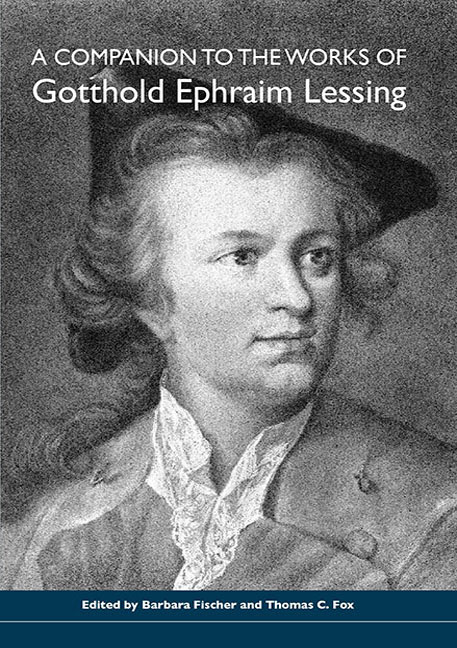Book contents
- Frontmatter
- Contents
- List of Illustrations
- Acknowledgments
- Lessing Editions and Abbreviations
- Selected Works by Lessing
- Introduction
- Lessing's Life, Work, and Times
- Criticism and Aesthetics
- Philosophy and Theology
- Drama and Drama Theory
- Reception
- Lessing and the Third Reich
- Lessing on the German-Speaking Stage in the Federal Republic of Germany, Austria, and Switzerland, 1945–1990
- Lessing on the East German Stage and Screen
- Modern Criticism in Historical Context: 200 Years of Lessing Reception
- Contact Organizations
- Works Cited
- Notes on the Contributors
- Index
Lessing on the East German Stage and Screen
from Reception
Published online by Cambridge University Press: 28 April 2017
- Frontmatter
- Contents
- List of Illustrations
- Acknowledgments
- Lessing Editions and Abbreviations
- Selected Works by Lessing
- Introduction
- Lessing's Life, Work, and Times
- Criticism and Aesthetics
- Philosophy and Theology
- Drama and Drama Theory
- Reception
- Lessing and the Third Reich
- Lessing on the German-Speaking Stage in the Federal Republic of Germany, Austria, and Switzerland, 1945–1990
- Lessing on the East German Stage and Screen
- Modern Criticism in Historical Context: 200 Years of Lessing Reception
- Contact Organizations
- Works Cited
- Notes on the Contributors
- Index
Summary
In part because the east Germans proclaimed the German humanist heritage their own, in part because Lessing and much of his oeuvre stem from the Protestant area that came to comprise communist Germany, Lessing played an important and visible role in East German culture. The government honored outstanding school children with the Lessing Medal and awarded leading intellectuals the Lessing Prize. Inasmuch as theater productions greatly influenced East German attitudes towards Lessing, we concentrate in the following on Soviet Zone and East German stagings of Lessing's Emilia Galotti (1772), Minna von Barnhelm (1767), and Nathan der Weise (Nathan the Wise, 1779). We also discuss two East German films based on Emilia Galotti and Minna von Barnhelm, for these interpretations reached large audiences; indeed, the Minna film continues to be aired on German television today. Finally, we examine the radical rereading of Lessing and the Enlightenment advanced by Heiner Müller, after Brecht the most important playwright of East Germany.
East German cultural arbiters utilized Lessing to illustrate that their country had inherited and realized the German Classical tradition, to demonstrate that East Germany represented enlightenment and the end of History, to protest war, the division of Germany, and West German militarism, among other things. As is the case with cultural products in a dictatorship, it is difficult to ascertain to what extent directors actually ascribed to the reductionist terms in which they at times discussed their work. But it is certainly worth noting at the outset that Lessing's plays did contain a contemporary relevance for East Germans, and that directors and the public were intelligent enough to perform their own deconstructionist readings. The use and abuse of absolute, dictatorial power depicted in Lessing's three major plays would not, for an East German audience, have been a matter of historical interest only. The reaction, in Emilia Galotti, of Appiani and Odoardo to those abuses — their withdrawal from the court and their attempts to establish a private idyll — were also common strategies in East Germany, especially after the construction of the Berlin Wall. After the collapse, in 1976, of the brief thaw initiated by Party Secretary Erich Honecker, and after the heavy-handed persecutions of artists in 1979, this movement of inner emigration accelerated, creating the so-called Nischengesellschaft and also the alternative society located in East Berlin's bohemian Prenzlauer Berg district.
- Type
- Chapter
- Information
- A Companion to the Works of Gotthold Ephraim Lessing , pp. 301 - 326Publisher: Boydell & BrewerPrint publication year: 2005



